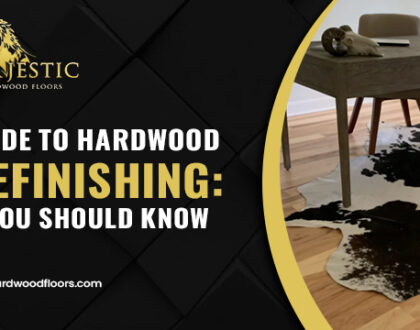What Hardwood Floor Finish Is More Durable: A Comprehensive Guide to Hardwood Floor Refinishing

When it comes to enhancing and preserving the beauty of your hardwood floors, choosing the right finish is crucial. The durability of the finish determines how well your floors will withstand daily wear and tear, spills, and foot traffic. In this guide, we’ll explore various hardwood floor refinishing and help you understand which one might be the most durable for your needs.
Understanding Hardwood Floor Refinishing:
Hardwood floor refinishing is a process that involves sanding down the existing finish on your floors and applying a new one. This not only revitalizes the appearance of the wood but also provides an opportunity to choose a finish that aligns with your lifestyle and preferences.
Common Types of Hardwood Floor Finishes:
- Polyurethane Finish:
- Durability: Polyurethane finishes, both water-based and oil-based, are known for their durability. They create a protective layer on the wood surface, making it resistant to scratches, stains, and moisture.
- Pros: Excellent durability, available in various sheens (gloss, semi-gloss, satin), and relatively easy to maintain.
- Cons: Can give a plastic-like appearance, and oil-based options may have a longer drying time and emit strong odors.
- Oil-Based Finish:
- Durability: Oil-based finishes penetrate the wood, providing a deep, rich appearance. They offer good durability but might require more maintenance over time.
- Pros: Enhances the natural beauty of the wood, easy to touch up, and suitable for older hardwood floors.
- Cons: Longer drying time, emits odors during application, and might yellow over time.
- Water-Based Finish:
- Durability: Water-based finishes are environmentally friendly and offer excellent durability. They dry faster than oil-based alternatives and are resistant to yellowing.
- Pros: Low odor, quick drying time, and maintains the natural color of the wood.
- Cons: Can be more expensive, might not penetrate wood as deeply as oil-based finishes.
- Wax Finish:
- Durability: Wax finishes provide a low sheen and require regular maintenance. While they might not be as durable as polyurethane, they are easy to repair.
- Pros: Offers a natural appearance, easy to apply and repair, and doesn’t require sanding for touch-ups.
- Cons: Needs regular reapplication, may not provide as much protection as other finishes.

Choosing the Most Durable Finish for Your Hardwood Floors:
- Consider Your Lifestyle: If you have a busy household with kids and pets, a more robust finish like polyurethane might be ideal. For lower-traffic areas, wax finishes can provide a charming, natural look.
- Budget and Maintenance: Water-based finishes might have a higher upfront cost, but their lower maintenance requirements could make them cost-effective in the long run. Oil-based finishes are generally more budget-friendly.
- Aesthetics: The appearance you desire also plays a crucial role. If you prefer a glossy finish, polyurethane might be the way to go. For a more natural, matte look, wax finishes can be a great choice.
Conclusion:
In the quest for the most durable Hardwood floor refinishing, there’s no one-size-fits-all solution. Each type of finish comes with its own set of advantages and considerations. Assessing your lifestyle, budget, and aesthetic preferences will guide you toward the finish that will not only withstand the test of time but also enhance the beauty of your hardwood floors. Whether it’s the robust protection of polyurethane or the natural charm of wax, the key is to make an informed choice tailored to your specific needs.
Want to find out more? Visit us at Majestic Hardwood Floors!
Recommended Posts

Cleaning And Caring For Your Hardwood Floors
December 14, 2022

Tips To Increase The Longevity Of Hardwood Floors
November 25, 2022

